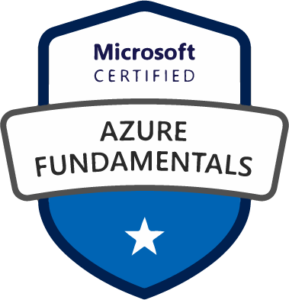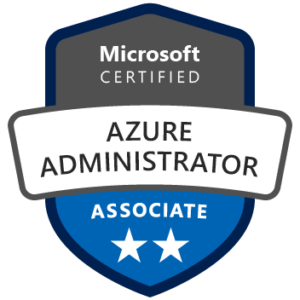Ingresse Agora no Método que Profissionais de TI estão seguindo para conquistar salários de 15K, tornando-se Especialistas em Cloud Computing
Programa profissão cloud
Esse programa te posiciona como um Administrador Azure e te dá acesso a vagas no Novo Mercado de TI: Cloud Computing através da preparação completa e personalizada para as certificações AZ-900 e AZ-104, e mais alguns Bônus Incríveis!

- Treinamento AZ-900 Oficial Atualizado
- Simulados Realísticos com Vídeos Explicativos
- Laboratórios Práticos na Plataforma Azure
- Material Oficial em Inglês, curso em Português
- Certificados Oficial Microsoft
- Acesso ao portal por 1 ano

- Treinamento AZ-104 Oficial Atualizado
- Simulados Realísticos com Vídeos Explicativos
- Laboratórios Práticos na Plataforma Azure
- Material Oficial em Inglês, curso em Português
- Certificado Oficiais Microsoft
- Acesso ao portal por 1 ano
E mais esses Bônus Incríveis!
Suporte
Premiere
1h por mês de suporte 1a1 com Zeca Nunes, pre-agendado e não acumulativo
U$150 em
Créditos Azure
Realize laboratório direto na plataforma, aprende com a mão na massa!
Comunidade
Profissão Cloud
Sua galera, focada em um só objetivo, trocando experiências e oportunidades, esse é o melhor lugar para estar.
Simulados Realísticos de Autoaprendizagem
A maneira mais rápida de você aprender a teoria, mesmo errando os simulado, você terá um vídeo lendo a questão de inglês para português e mostrando porque a alternativa correta é essa e não aquelas
Mentoria de Carreira
em Grupo
Evento Online, 1x por mês, todos os alunos podem participar para definir os próximos passos para seu desenvolvimento na carreira
Gravação
Matatona Cloud
Acesso a gravação dos eventos de Workshop realizados em 2020: Networking Advanced e Migrating to Azure. Laboratórios avançados para aumentar seu conhecimento.
De: R$ 5.000
12x R$195
-ou-R$1997 à vista
Cresça na carreira de Cloud Computing com o melhor programa de Desenvolvimento Profissional!
Sobre o seu Instrutor
Zeca Nunes
Profissional de TI, Arquiteto de Nuvem e instrutor oficial Microsoft.
Ministra treinamentos de Cloud Computing para grandes corporações: Itaú, Bradesco, Porto Seguro, Casas Bahia, Petrobras e muito outros.

Suas Perguntas Respondidas
Como funciona a Garantia?
A partir da sua inscrição, você tem 14 dias para avaliar o Portal do Programa e se não ficar satisfeito, basta enviar um email para [email protected] solicitando o cancelamento que devolvemos o seu investimento imediatamente e sem perguntas.
Qual a duração do curso?
Todos os curso são Online e Gravados, o que te garante a possibilidade de assistir quando quiser e quantas vezes desejar, dentro de prazo de 1 ano contado a partir da data da matrícula. É tempo mais que suficiente para você completar o curso uma dezena de vezes.
É vitalício?
O material oficial (SkillPipe) é vitalício e recebe atualizações por 6 meses, depois desse prazo ele para de atualizar mas continua acessível. Quanto ao curso, em média os alunos levam de 2 a 3 meses para conquistar a certificação AZ-104, mesmo assim você terá acesso disponível por 1 ano contado da data de inscrição.
Certificado ou Certificação?
Assim que você assistir todas as aulas e completar os laboratórios, receberá seu Certificado Oficial de Conclusão do Curso emitido pela Microsoft e assinado pelo Instrutor credenciado Zeca Nunes, esse certificado pode (e deve) ser utilizado no seu Curriculum e no Linkedin. Já a Certificação é um passo adicional e opcional, onde através de passar em uma prova você recebe um título de validade internacional que te garante reconhecimento naquela tecnologia pelo mercado de TI, vale muito a pena pois te abre portas para esse mercado!
A prova de certificação tem custo?
Nesse Programa você recebe todo treinamento e acompanhamento para sua preparação aos exames apresentados, o custo da inscrição no exame fica por conta do aluno que desejar fazer as provas, que variam entre U$60 e U$100 cada prova.
Dentro da nossa comunidade sempre compartilhamos dicas de eventos Microsoft que estão oferecendo Vouchers para a prova, dezenas de alunos já se beneficiaram dessas dicas para garantir suas certificações sem custo, mas não posso garantir que todos vão conseguir vouchers gratuitos.
Ementa dos Treinamentos
Comece hoje mesmo
Module 1: Describe core Azure conceptsIn this module, you’ll take an entry level end-to-end look at Azure and its capabilities, which will provide you with a solid foundation for completing the available modules for Azure Fundamentals.Lessons
- Introduction to Azure fundamentals
- Discuss Azure fundamental concepts
- Describe core Azure architectural components
After completing this module, students will be able to:
- Understand the benefits of cloud computing in Azure and how it can save you time and money
- Explain concepts such as high availability, scalability, elasticity, agility, and disaster recovery
- Describe core Azure architecture components such as subscriptions, management groups, resources and
- Summarize geographic distribution concepts such as Azure regions, region pairs, and availability zon
Module 2: Describe core Azure servicesIn this module, you learn about core Azure services like Azure database, Azure compute, Azure storage, and Azure Networking.
Lessons
- Explore Azure database and analytics services
- Explore Azure compute services
- Explore Azure Storage services
- Explore Azure networking services
After completing this module, students will be able to:
- Understand the breadth of services available in Azure including compute, network, storage, and datab
- Identify virtualization services such as Azure Virtual Machines, Azure Container Instances, Azure Ku
- Compare Azure’s database services such as Azure Cosmos DB, Azure SQL, Azure Database for MySQL, Azur
- Examine Azure networking resources such as Virtual Networks, VPN Gateways, and Azure ExpressRoute
- Summarize Azure storage services such Azure Blob Storage, Azure Disk Storage, and Azure File Storage
Module 3: Describe core solutions and management tools on AzureIn this module, you’ll learn about AI machine learning, Azure DevOps, monitoring fundamentals, management fundamentals, serverless computing fundamentals. and IoT fundamentals.
Lessons
- Choose the best AI service for your needs
- Choose the best tools to help organizations build better solutions
- Choose the best monitoring service for visibility, insight, and outage mitigation
- Choose the best tools for managing and configuring your Azure environment
- Choose the best Azure serverless technology for your business scenario
- Choose the best Azure IoT service for your application
After completing this module, students will be able to:
- Choose the correct Azure Artificial Intelligence service to address different kinds of business chal
- Choose the best software development process tools and services for a given business scenario.
- Choose the correct cloud monitoring service to address different kinds of business challenges.
- Choose the correct Azure management tool to address different kinds of technical needs and challenge
- Choose the right serverless computing technology for your business scenario.
- Choose the best Azure IoT service for a given business scenario.
Module 4: Describe general security and network security featuresIn this module, you will learn how to protect yourself against security threats, and secure your networks with Azure.
Lessons
- Protect against security threats on Azure
- Secure network connectivity on Azure
After completing this module, students will be able to:
- Strengthen your security posture and protect against threats by using Azure Security Center.
- Collect and act on security data from many different sources by using Azure Sentinel.
- Manage dedicated physical servers to host your Azure VMs for Windows and Linux by using Azure Dedica
- Identify the layers that make up a *defense in depth* strategy.
- Explain how Azure Firewall enables you to control what traffic is allowed on the network.
- Configure network security groups to filter network traffic to and from Azure resources within a Mic
- Explain how Azure DDoS Protection helps protect your Azure resources from DDoS attacks.
Module 5: Describe identity, governance, privacy, and compliance featuresIn this module, you will learn about Azure identity services, how to build a cloud governance strategy, and privacy, compliance and data protection standards on Azure.
Lessons
- Secure access to your applications by using Azure identity services
- Build a cloud governance strategy on Azure
- Examine privacy, compliance, and data protection standards on Azure
After completing this module, students will be able to:
- Explain the difference between authentication and authorization.
- Describe how Azure Active Directory provides identity and access management.
- Explain the role single sign-on (SSO), multifactor authentication, and Conditional Access play.
- Make organizational decisions about your cloud environment by using the CAF for Azure.
- Define who can access cloud resources by using Azure role-based access control.
- Apply a resource lock to prevent accidental deletion of your Azure resources.
- Apply tags to your Azure resources to help describe their purpose.
- Control and audit how your resources are created by using Azure Policy.
- Enable governance at scale across multiple Azure subscriptions by using Azure Blueprints.
- Explain the types of compliance offerings that are available on Azure.
- Gain insight into regulatory standards and compliance on Azure.
- Explain Azure capabilities that are specific to government agencies.
Module 6: Describe Azure cost management and service level agreementsIn this module, you will learn how to plan and manage Azure costs, and how to choose the right Azure services though SLAs and service lifecycle.
Lessons
- Plan and manage your Azure costs
- Choose the right Azure services by examining SLAs and service lifecycle
After completing this module, students will be able to:
- Use the Total Cost of Ownership Calculator.
- Describe the different ways you can purchase Azure products and services.
- Use the Pricing calculator to estimate the monthly cost of running your cloud workloads.
- Define the major factors that affect total cost and apply recommended practices to minimize cost.
- Describe what a service-level agreement (SLA) is and why SLAs are important.
- Identify factors, such as the service tier you choose, that can affect an SLA.
- Combine SLAs to compute a composite SLA.
- Describe the service lifecycle in Azure.
Module 1: Identity
In this module, you will learn how to secure identities with Azure Active Directory, and implement users and groups.Lessons
- Azure Active Directory
- Users and Groups
Lab : Manage Azure Active Directory IdentitiesAfter completing this module, students will be able to:
- Secure and manage identities with Azure Active Directory.
- Implement and manage users and groups.
Module 2: Governance and Compliance
In this module, you will learn about managing your subscriptions and accounts, implementing Azure policies, and using Role-Based Access Control. Lessons
- Subscriptions and Accounts
- Azure Policy
- Role-based Access Control (RBAC)
Lab : Manage Subscriptions and RBACLab : Manage Governance via Azure PolicyAfter completing this module, students will be able to:
- Implement and manage Azure subscriptions and accounts.
- Implement Azure Policy, including custom policies.
- Use RBAC to assign permissions.
Module 3: Azure Administration
In this module, you will learn about the tools an Azure Administrator uses to manage their infrastructure. This includes the Azure Portal, Cloud Shell, Azure PowerShell, CLI, and Resource Manager Templates. This module includes: Lessons
- Azure Resource Manager
- Azure Portal and Cloud Shell
- Azure PowerShell and CLI
- ARM Templates
Lab : Manage Azure resources by Using the Azure Portal Lab : Manage Azure resources by Using ARM TemplatesLab : Manage Azure resources by Using Azure PowerShell (optional)Lab : Manage Azure resources by Using Azure CLI (optional)After completing this module, students will be able to:
- Leverage Azure Resource Manager to organize resources.
- Use the Azure Portal and Cloud Shell.
- Use Azure PowerShell and CLI.
- Use ARM Templates to deploy resources.
Module 4: Virtual Networking
In this module, you will learn about basic virtual networking concepts like virtual networks and subnetting, IP addressing, network security groups, Azure Firewall, and Azure DNS. Lessons
- Virtual Networks
- IP Addressing
- Network Security groups
- Azure Firewall
- Azure DNS
Lab : Implement Virtual NetworkingAfter completing this module, students will be able to:
- Implement virtual networks and subnets.
- Configure public and private IP addressing.
- Configure network security groups.
- Configure Azure Firewall.
- Configure private and public DNS zones.
Module 5: Intersite Connectivity
In this module, you will learn about intersite connectivity features including VNet Peering, Virtual Network Gateways, and Site-to-Site Connections. Lessons
- VNet Peering
- VPN Gateway Connections
- ExpressRoute and Virtual WAN
Lab : Implement Intersite Connectivity After completing this module, students will be able to:
- Configure VNet Peering.
- Configure VPN gateways.
- Choose the appropriate intersite connectivity solution.
Module 6: Network Traffic Management
In this module, you will learn about network traffic strategies including network routing and service endpoints, Azure Load Balancer, and Azure Application Gateway. Lessons
- Network Routing and Endpoints
- Azure Load Balancer
- Azure Application Gateway
Lab : Implement Traffic ManagementAfter completing this module, students will be able to:
- Configure network routing including custom routes and service endpoints.
- Configure an Azure Load Balancer.
- Configure and Azure Application Gateway.
Module 7: Azure Storage
In this module, you will learn about basic storage features including storage accounts, blob storage, Azure files and File Sync, storage security, and storage tools. Lessons
- Storage Accounts
- Blob Storage
- Storage Security
- Azure Files and File Sync
- Managing Storage
Lab : Manage Azure storageAfter completing this module, students will be able to:
- Create Azure storage accounts.
- Configure blob containers.
- Secure Azure storage.
- Configure Azure files shares and file sync.
- Manage storage with tools such as Storage Explorer.
Module 8: Azure Virtual Machines
In this module, you will learn about Azure virtual machines including planning, creating, availability and extensions. Lessons
- Virtual Machine Planning
- Creating Virtual Machines
- Virtual Machine Availability
- Virtual Machine Extensions
Lab : Manage virtual machinesAfter completing this module, students will be able to:
- Plan for virtual machine implementations.
- Create virtual machines.
- Configure virtual machine availability, including scale sets.
- Use virtual machine extensions.
Module 9: Serverless Computing
In this module, you will learn how to administer serverless computing features like Azure App Service, Azure Container Instances, and Kubernetes. Lessons
- Azure App Service Plans
- Azure App Service
- Container Services
- Azure Kubernetes Service
Lab : Implement Web AppsLab : Implement Azure Container InstancesLab : Implement Azure Kubernetes ServiceAfter completing this module, students will be able to:
- Create an app service plan.
- Create a web app.
- Implement Azure Container Instances.
- Implement Azure Kubernetes Service.
Module 10: Data Protection
In this module, you will learn about backing up files and folders, and virtual machine backups. Lessons
- File and Folder Backups
- Virtual Machine Backups
Lab : Implement Data ProtectionAfter completing this module, students will be able to:
- Backup and restore file and folders.
- Backup and restore virtual machines.
Module 11: Monitoring
In this module, you will learn about monitoring your Azure infrastructure including Azure Monitor, alerting, and log analytics. Lessons
- Azure Monitor
- Azure Alerts
- Log Analytics
- Network Watcher
Lab : Implement MonitoringAfter completing this module, students will be able to:
- Use Azure Monitor.
- Create Azure alerts.
- Query using Log Analytics.
- Use Network Watcher.
Evolua na sua Carreira de TI
Oferta com vagas limitadas podendo encerrar a qualquer momento.
Copyright © Zeca Nunes. All Rights Reserved